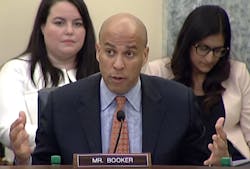With less than hour to go before a midnight deadline, the U.S. Senate on Friday joined the House to enact a “fix” to the hours of service restart provision that restores the regulation to the pre-July 2013 version. Oh, and the vote also kept the government running.
The annual funding bill for federal government, including the budget for the Dept. of Transportation, has been where Congress has blocked the restart since 2014, pending the completion of a DOT study on the real-world effectiveness of the 2013 HOS changes. The changes included requiring two overnight off-duty stretches between 1 a.m. and 5 a.m. to reset a truck driver’s workweek.
Trucking has lobbied successfully for the suspension each year since, arguing that the change, in addition to disrupting the sleep schedules of some drivers, put more trucks on the road during the morning rush hour, increasing congestion and the risk of accidents.
However, a drafting error in the language included in the 2016 funding bill left the HOS regulations in a potential legal limbo, prompting the need for the correction in the federal funding extension just passed. The correction also locks in the suspension, meaning it won’t have to be renewed each year until the study is complete.
“It is now our hope that as an industry, we can put this issue firmly in the rearview mirror,” said American Trucking Assns. President and CEO Chris Spear. “Thanks to hard work by Congressional leaders of both parties and in both chambers, we are one step closer to having an hours-of-service restart rule that makes sense and puts safety first”
The restart rollback has faced annual opposition, however. The Advocates for Highway & Auto Safety last week called the inclusion of the restart provision “a major assault on safety” that would “decimate” the HOS rule.
“The House and Senate Republican leaders just delivered special trucking interests an early Christmas present,” said AHAS President Jackie Gillan. “Special interests succeeded in getting this rollback despite the growing problem of truck driver fatigue in the industry, unabated increases in truck crash deaths and injuries, and overwhelming public opposition. … It is simply unthinkable that any industry with such an abysmal safety record and responsible for so many innocent deaths and injuries could actually find so many willing partners in Congress to push their greedy anti-safety agenda.”
And Sen. Cory Booker (D-NJ), who has led opposition to the rollback in the Senate, opened a forum on transportation security last week by echoing the AHAS position on truck crashes. Booker called on Congress “to work together” to address “one of the monumental areas in which people are dying in America.”
Trucking, on the other hand, insists the 2013 HOS changes would increase the number of crashes involving commercial vehicles.
“These rules, put forward based on a very limited laboratory sleep study, could have had serious negative safety impacts,” ATA’s Spear said. “The restart is an important tool for drivers, not to maximize driving time, but to have the flexibility to maximize off-duty time and time at home, and we are pleased that drivers will continue to have unrestricted access to it.”
About the Author
Kevin Jones 1
Editor
Kevin has served as editor-in-chief of Trailer/Body Builders magazine since 2017—just the third editor in the magazine’s 60 years. He is also editorial director for Endeavor Business Media’s Commercial Vehicle group, which includes FleetOwner, Bulk Transporter, Refrigerated Transporter, American Trucker, and Fleet Maintenance magazines and websites.
